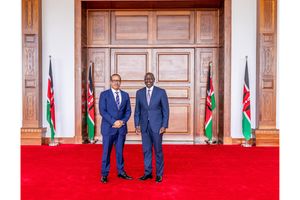Zanzibar’s First Vice President recounts how he helped his predecessor

What you need to know:
- The Vice President, who has succeeded the late Seif Sharrif Hamad, believes in creating strong institutions which meet demands of the economy, and attract more investments
Zanzibar. Zanzibar’s First Vice President is advocating the creation of strong institutions as the best way to uniting Zanzibaris - and reveals for the first time how he personally helped Seif Sharif Hamad out of unconstitutional counts in a court of law.
Mr Othman Masoud Othman told The Citizen in an interview on Sunday that during his days as Deputy Attorney General (DAG) of Zanzibar, the late Hamad was facing a case related to defying an order of one of the Regional Commissioners.
The late Hamad was accused of defying an order from the regional commissioner that barred him from entering his area of jurisdiction and conducting political activities.
Speaking during an interview with Mwananchi Digital at his home in Unguja, Mr Othman said after strong foundations built by President Hussein Ali Mwinyi and Mr Hamad now paved the way for building efficient institutions as well as flexible and competitive policies.
“The government institutions need to be streamlined in order to meet demands of developing the economy and attracting more investments,” he said.
He said Zanzibar had political patronage that denied formulation of strong institutions after revolutions, instead people invested in strengthening political parties.
As a result, those wishing to meet their political agenda have been instigated and institutionalised to show that there were problems among the Zanzibaris.
“There were no characters of discrimination among the Zanzibari’s basing on political affiliation, religious beliefs, geographical locations or ethnic origins unlike other countries,” he said.
Poor governance
“Our problem has been caused by poor governance. Strong institutions will enable us to build a brighter future for our children - which are our responsibilities,” he added. He said few, but efficient institutions and hardworking promotion were needed, saying some of the government employees deserved no pay due to underperformance.
“These are those going at work as if they have visited the shop. Also, science and technology development are supposed to improve services delivery to citizens, either physically or technologically from a distance,” he said.
He gave an example of the court summoning people with cases to a certain judge to arrive at the court at 8:30am, instead of making different time settings to improve efficiency and reduce congestion at the courts premises.
Regarding investment attraction, Mr Othman said the government could put incentive packages, identify and survey the lands for investment, something that would serve time and accelerate development.
“Tax collection systems need to be strengthened and tax increments procedures reviewed in order to avoid discouraging investors. The president has said categorically that he doesn’t believe in huge taxes and multiple taxation,” he said.
According to him, someone planning to pay land dues could be discouraged with multiple taxes to the extent of deciding to suspend payments, therefore denying the government with prerequisite revenues.
The government should formulate appropriate systems that will attract clients to make lands transactions that will enable the government to fund its activities.
“Therefore, there are several things that need to be done in order to help the President and the government to meet expectations of citizens,” he said. Explaining on how he met the departed Zanzibar’s fallen Hamad, he said the two met at the court where the opposition political party (CUF) filed a case to challenge the regional commissioner decision to bar the former vice president from entering his area of jurisdiction.
“I was representing the government at the court. When I returned to the office, I told my boss (the-then Attorney General (AG) that it was difficult to defend the regional commissioner in the case because the president himself lacked authority to bar someone from entering a region, he said.
Mr Othman said in the next mentioning of the case he told the court that the regional commissioner was advised to withdraw his letter, but he could not honour the advice therefore he should be summoned in person.
He said his submission was well received by Mr Hamad who thanked God that there were people in the legal fraternity who could stand for justice and rights of the people, saying it was on that day that he captured his attention.
Furthermore, he said later, he came to work closely with him after becoming the First Vice President when he showed inquisitiveness of learning and knowing many things.
“It automatically happened that Mr Hamad admired me. Therefore, he started involving me in many issues and sometimes sought my advice personally or through his assistants,” he said, adding. “Even when my appointment as the Zanzibar AG was revoked by President Ali Mohamed Shein, he was among the first people who called me.”
He asked my whereabouts, I told him that I took my children to a school in Forodhani with Mr Hamad said he did not expect the matter would have reached that stage.
His involvement to the team of experts who prepared the ACT-Wazalendo Election Manifesto last year shows how he involved me in many issues and believed in professionalism.
Speaking of lessons learnt from him, Mr Othman said one needs to be a good listener who would not get tired of listening to someone; humbleness, flexibility and sacrificing personal benefits for the interest of the people. “He could joke with you before serious discussions. Probably, these are issues and leadership qualities that I would like to emulate, but it is difficult to have them,” he said.
He added: “These qualities made him to be loved by the majority, although some of them loved and even knew him after his death.”
He said Mr Hamad was also a believer of reconciliation unlike the majority of people who would prioritise personal benefits after being entrusted with leadership positions.
He worked hard in the interests of the country, despite the abusive language directed at him by some people - saying that, however, those were among the things worth to be emulated.




